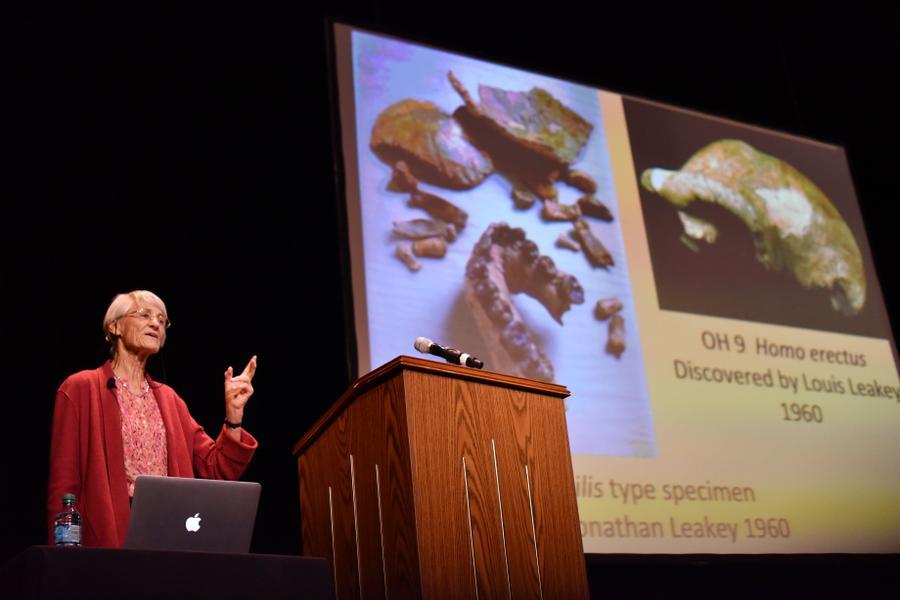
Paleoanthropologist Meave Leakey’s study of fossils has taught her about the interconnectedness of the human race.
“Because we evolved from Africa, we are all Africans,” Leakey said. “Africa gave us ourselves, which means we really need to understand our birthplace and our history, how we came to be what we are today.”
Leakey not only spoke on studying fossils in northern Africa to piece together the human evolutionary timeline, but she spoke on the importance of recognizing Africa as a significant continent in both size and history, as the birthplace of the human race.
Leakey’s speech at 7 p.m. Monday at the Missouri Theatre was the keynote address of MU’s first-ever “Our African Origins” symposium, which will continue with six more guest speeches on human evolution from 8:30 a.m. to 4:30 p.m. Tuesday in Monsanto Auditorium.
In her speech, entitled, “Discovering Our Ancestors in the Desert of Northern Kenya,” Leakey primarily focused on her findings in northern Kenya’s Turkana Basin.
Homo erectus moved out of Africa 1.8 million years ago, Leakey said.
“Nobody thinks of Africa as really what it is, which is a huge continent,” Leakey said. “Africa is so misunderstood. People think of it as diseased, with poverty, war and mosquitoes.”
To truly understand Africa, Leakey said, one must understand its size. Africa is three times the size of Australia, more than twice the size of India and China combined and almost twice the size of South America.
“Because it is so big, (Kenya) has developed later than other countries, but it is coming,” Leakey said. “Africa is a place to watch.”
Leakey spoke about her parents, paleoanthropologists Louis and Mary Leakey, renowned for being the first to search for human fossils in the 1930s and, in 1959, the first to discover a hominid fossil. She also spoke on her personal fossil findings and efforts to uncover information about human ancestors’ habitats and diets through examining aspects of fossils such as tooth enamel.
Although Leakey was pursuing fieldwork in the Afar Triangle of Ethiopia in late November, 1974, she left the site before the research team, specifically paleoanthropologist Donald Johanson and graduate student Tom Gray, found hominid “Australopithecus afarensis,” nicknamed “Lucy,” on Nov. 24, 1974.
“Lucy,” 3.2 million years old, has become known throughout the world as one of the earliest human ancestors.
“It’s unfortunate that many people know of Lucy, but do not know much about Meave Leakey,” said Caroline Brown, senior and marketing director of the MSA/GPC Department of Student Activities. “It’s a really exciting opportunity to have Meave Leakey come here to share her knowledge and for people to become more familiar with what she has done.”
In March 2001, 27 years after the discovery of “Lucy,” Leakey’s research team added to the evolutionary timeline by uncovering the first fossils of a 3.2- to 3.5-million-year-old hominin, “Kenyanthropus Platyops.”
Despite continual technological advances, Leakey said searching for fossils is based on wandering around and scanning landscapes, the same technique that was used when paleoanthropology was developed in the 1930s. However, advances such as CT scans, communication and mapping devices have aided paleoanthropologists in discussing and analyzing the fossils they find.
When asked what stood out to him about Leakey’s speech, Columbia resident Tracy King said: “It was the amount of energy (Leakey and her research team) put toward studying the fossils and finding them. It took hours and hours of picking little pieces of bone. It’s pretty interesting, and it takes a lot of dedication.”
Leakey earned a doctoral degree in zoology from the University of North Wales in 1968. She is currently a professor at Stony Brook University and is still actively involved in paleoanthropological research through the Turkana Basin Institute in Kenya.
The entire symposium is free and open to the public.
“We hope that the opportunity to bring these top caliber scholars in this exciting field to MU will increase the visibility of the research, our university and the MU African Interdisciplinary Studies Hub within the community, alumni, state and even nation,” MU African Interdisciplinary Studies Hub leader Nadege Uwase said in an email. “We want the entire symposium to raise awareness of the importance of Africa in understanding humanity, its history and the human condition.”
The MSA/GPC Department of Student Activities and the MU African Interdisciplinary Studies Hub partnered to program Leakey’s speech, which they estimate attracted 600 MU faculty, students, staff and Columbia residents.
_Edited by Waverly Colville | [email protected]_